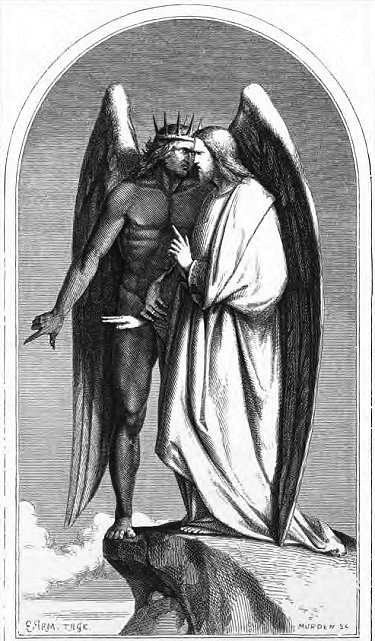We run our website the way we wished the whole internet worked: we provide high quality original content with no ads. We are funded solely by your direct support. Please consider supporting this project.

What Does Spiritual Warfare Have To Do with the Cross?
Last week, we covered a few posts on the nature of the Atonement and the Christus Victor view. The following continues this theme, specifically looking the motif of spiritual warfare and how it relates to Christ’s work on the cross. This is an adaptation from Greg’s article in The Nature of the Atonement: Four Views.
Satan in the New Testament
[In the New Testament] Satan is depicted as possessing “all the kingdoms of the world” — to the point where he gives authority to rule these kingdoms to anyone he pleases (Lk 4:5-6). In fact, the various kingdoms of the world can be described as a single kingdom under Satan’s rule (Rev. 11:15, cf. Rev. 13). John goes so far as to claim that the entire world is “under the power of the evil one” (I Jn 5:19) while Paul doesn’t shy away from labeling Satan “the god of this world” (2 Cor 4:4) and “the ruler of the kingdom of the air” (Eph. 2:2). It is because of this pervasive and oppressive diabolic influence that Paul, in typical apocalyptic fashion, depicts this present world system as fundamentally evil (Gal 1:4; Eph 5:6).
Everything Jesus was about was centered on vanquishing this empire, taking back the world that Satan had seized, and restoring its rightful viceroys – humans – to their position of guardians of the earth (Gen. 1:26-28, cf. 2 Tim. 2:12; Rev. 5:10). Each one of Jesus’ many healings and deliverances were understood to diminish Satan’s hold on the world and to liberate people, to whatever degree, from his stronghold. (4) Peter succinctly summarized Jesus’ ministry to Cornelius when he said that Jesus “went about doing good and healing all who were oppressed by the devil…” (Ac 10:38, emphasis added). …
The Battle Against The Powers
Intensifying the apocalyptic view of the time, Jesus and New Testament authors saw demonic influences not only in demonized and diseased people, but directly or indirectly in everything that was not consistent with God’s reign. For example, swearing oaths, temptation, lying, legalism, false teachings, anger, spiritual blindness and persecution were all seen as being satanically inspired. This ought not surprise us since, again, Jesus and his followers all believed the devil had significant control over the entire world (I Jn 5:19). For this reason Paul taught that whatever earthly struggles disciples found themselves involved in, they must understand that their real struggle was against “the rulers, against the authorities, against the cosmic powers of this present darkness, against the spiritual forces of evil in the heavenly places” (Eph 6:12, cf. 2 Cor 10:3-5). The kingdom of the roaring lion (I Pet 5:8) was an ever present reality to Jesus and his earliest disciples.
This last Pauline passage brings up a final and very important aspect of the New Testament’s apocalyptic worldview. Beyond the frequent references to Satan and demons throughout the New Testament, we find Paul (and others, e.g. I Pet 3:21-22) making reference to other spiritual powers, most of which have their counterpart in the apocalyptic literature of the time. Thus we read about “rulers,” “principalities,” “powers” and “authorities” (Rom. 8:38; 13:1; I Cor 2:6, 8; 15:24; Eph 1:21; 2:2; 3:10; 6:12; Col 1:16: 2:10, 15) along with “dominions” (Eph 1:21; Col 1:16), “cosmic powers” (Eph 6:12), “thrones” (Col 1:16), “spiritual forces” (Eph 6:12), “elemental spirits of the universe” (Col 2:8, 20; Gal 4:3, 8-9) as well as other spiritual entities. …
Christ’s Victory Over the Powers
According to the New Testament, the central thing Jesus did was drive out the “prince of this world” (Jn 12:31). He came to “destroy the works of the devil” (I Jn 3:8). He came to “destroy the one who has the power of death, that is, the devil” in order to “free those who all their lives were held in slavery by the fear of death” (Heb. 2:14-15). Jesus lived, died and rose again to establish a new reign that would ultimately “put all his enemies under his feet” (I Cor 15:25). Though “the strong man” was “fully armed,” one who was “stronger than he” had finally arrived who could attack and overpower him” (Lk 11:21-22). While the cosmic “thief comes only to steal and kill and destroy,” Jesus came into the world to vanquish the thief so that all “may have life and have it abundantly” (Jn 10:10). Jesus “disarmed the rulers and authorities and made a public example of them, triumphing over them…” (Col 2:15). In a word, Jesus came to end the cosmic war that had been raging from time immemorial and to set Satan’s captives free ( Lk 4:18; Eph 4:8).
The first messianic prophecy given in Scripture — indeed, the first prophecy given, period — announced just this: a descendant of Eve would crush the head of the serpent who originally deceived humanity into joining in his rebellion (Gen. 3:15). It is therefore not surprising that the original disciples expressed what the messiah accomplished in terms of a victory over the ancient serpent.
The very first Christian sermon, according to Luke, centered on this cosmic victory. (See Ac 2:32-36). …
Through his incarnation, life, teachings, death and resurrection, Jesus manifested the power of God over Satan, demons and the entire spectrum of rebellious principalities and powers. The one who created “thrones…dominions …rulers…[and] powers” (Col 1:16) became incarnate, died and was resurrected in order for God “to reconcile to himself all things, whether things on earth or things in heaven, by making peace through his blood, shed on the cross” (Col. 1:20). This is what Christ accomplished. (26-31)
Category: General
Tags: Atonement, Cruciform Theology, Jesus, Spiritual Warfare
Topics: Spiritual Warfare, Cosmic Conflict
Related Reading

Was Jesus Really Human Like the Rest of Us?
Did Jesus really live as a human like you and I do? Or did he walk around with special divine powers that we don’t have? In the previous post, I introduced the question: How was God both fully God and fully man? I explained the classical model of the Incarnation which views the incarnate Jesus…

Why Should I Say Jesus Died in My Place? (podcast)
Greg considers how Jesus’s death on the cross saved each of us. Episode 581 http://traffic.libsyn.com/askgregboyd/Episode_0581.mp3 4

The Cruciform Trinity
As paradoxical as it sounds, if God is supremely revealed when he stoops to the infinite extremity of becoming his own antithesis on the cross, then we must conclude that stooping to this extremity out of love must, in some sense, be intrinsic to who God eternally is. And rendering this coherent necessitates that we…

The Greatest in the Kingdom (2 of 2)
Article by Natalie Frisk This post is a summary of what was discussed at the ReKnew CrossVision Conference in regard to what and how we teach our kids about the cruciform hermeneutic. Taking Jesus into the Old Testament I co-lead a family-friendly home church where we sometimes get into spiritually deep conversations with children. There…
